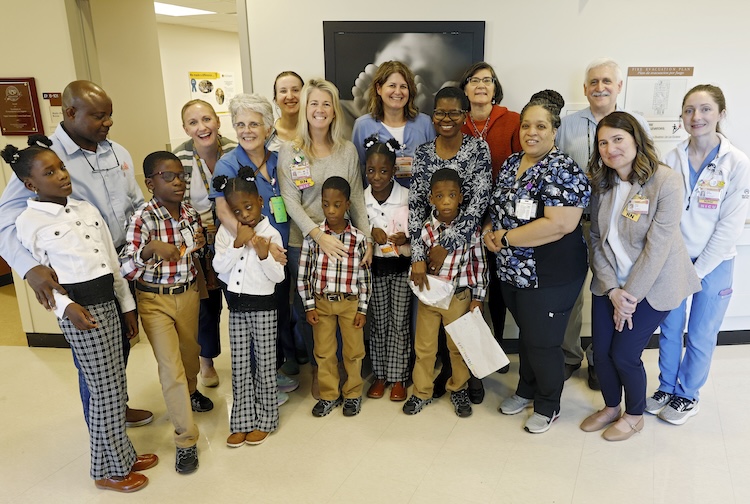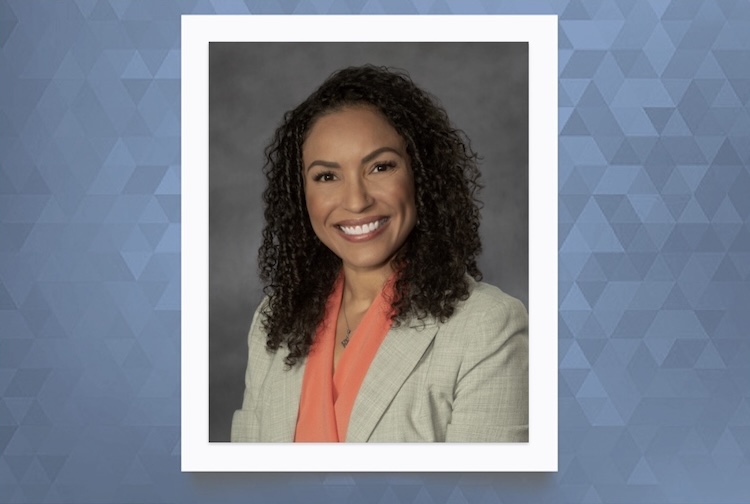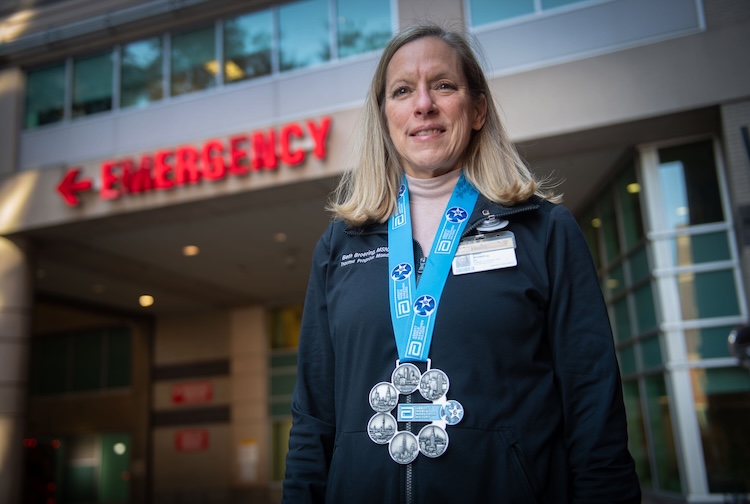A race against time and the team that makes every second count
When minutes matter, the unbreakable resolve of VCU Health’s premier stroke care team saves lives.
June 03, 2025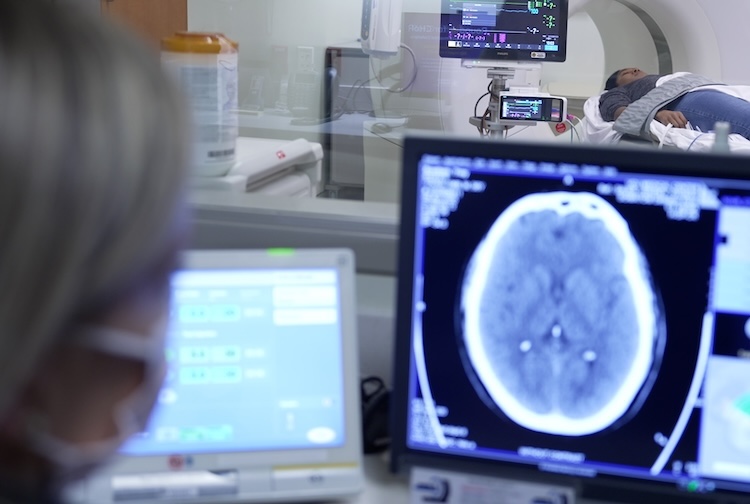 If necessary, VCU Health’s comprehensive stroke team tries to get an MRI of a patient within minutes of them entering the hospital to find the blockage. (Enterprise Marketing and Communications)
If necessary, VCU Health’s comprehensive stroke team tries to get an MRI of a patient within minutes of them entering the hospital to find the blockage. (Enterprise Marketing and Communications)
By Leigh Farmer
It all happened so fast. From the back of an ambulance, Chwanda Johnson could see, hear and feel the chaos around her. But she couldn’t talk or move. Her body was numb.
Moments before, Chwanda’s boyfriend found her in her car unable to speak. He knew to call 911 immediately – Chwanda was having a stroke.
As the ambulance pulled into the city of Richmond, the VCU Health sign was a beacon of hope.
“I thought ‘oh my God, they are going to fix me,’” Chwanda said.
One of the first people she saw was Alison Kurtz, R.N., an emergency department nurse at VCU Medical Center, with a whole team assembling right behind her.
“Her eyes were just alert, and she looked like she knew what was going on,” Kurtz said.
It didn’t take Kurtz long to realize that her patient had locked-in syndrome – a neurological condition that left Chwanda unable to move or speak, but she was aware of everything happening around her.
(Leigh Farmer, Joe Kuttenkuler, and Robin McLeod, Enterprise Marketing and Communications)
Chwanda remembers Kurtz too. “She said, ‘honey, we have to give you some oxygen,’” she recalled. After that, Chwanda went to sleep.
“She declined very, very rapidly,” Kurtz said.
“Chwanda was the closest to death I’ve ever seen,” John Reavey-Cantwell, M.D., Chwanda’s neurosurgeon.
Within mere seconds, VCU Health’s comprehensive stroke care team descended upon Chwanda.
“In those critical first moments, it’s not just speed that saves a life — it’s trust and communication among nurses, technologists, physicians and emergency teams working as one,” said Daniel Falcao, DO, co-medical director of the VCU Health Comprehensive Stroke Center. “At VCU Health, our team is ready.”
In sync and prepared to use the latest innovations, this dedicated group of medical professionals was ready to give Chwanda a fighting chance at surviving this stroke.
What makes VCU Health the premier stroke care team in the region
According to the Centers for Disease Control and Prevention (CDC), one stroke happens every 40 seconds in the United States. And every three minutes and eleven seconds someone dies from a stroke.
Often called “a brain attack,” a stroke significantly reduces or completely interrupts the flow of blood to the brain. It is the leading cause of serious long-term disability in the U.S., according to the CDC. While we often think that a stroke happens to people in their twilight years, it can actually happen to anyone.
Chwanda was just 48 years old.
When it comes to survival, time is everything.
“With every passing minute that the care is delayed, two million additional brain cells die,” Reavey-Cantwell said. “Seconds and minutes matter.”
Medical professionals across the country will give you a formula for surviving a stroke that is very simple: Time = Brain. The longer you wait to get medical help after the first symptom of a stroke, the less chance you have of survival.
At VCU Health, the stroke team drills down on that formula a bit further to provide patients with a better chance at a healthy recovery: Resources x Team x Speed = A chance to survive.
With every passing minute that the care is delayed, two million additional brain cells die. Seconds and minutes matter.
John Reavey-Cantwell, M.D., VCU Health neurosurgeon
VCU Health is Virginia’s first certified comprehensive stroke center and is a recognized member of the National Institutes of Health (NIH) StrokeNet. This means patients who are treated at VCU Health have access to groundbreaking clinical trials.
“We have made major investments to ensure every stroke patient receives fast, life-saving care,” Falcao said. “From adopting Tenecteplase (TNK), a faster-acting clot-busting medication, to using air transport with helicopters, we are breaking barriers to rapid treatment.”
The VCU Health Comprehensive Stroke Center has a designated operating room for emergency stroke cases that is ready at all times and equipped with the latest technology. The center also has clinical staff on call and available at a moment’s notice – from nursing to radiology to pharmacy to dedicated therapists.
“Strokes happen at three in the morning, when it is snowing out, on holidays, during rush hour,” said Dennis Rivet, M.D., the center’s co-medical director. “In all cases, these dedicated health care professionals drop everything and do whatever is necessary to provide what is literally lifesaving care.”
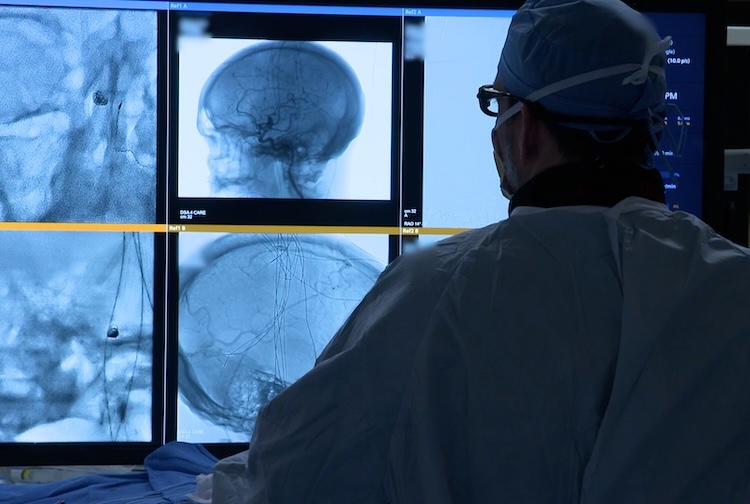
VCU Health neurosurgeons, like John Reavey-Cantwell, M.D., can capture blood clots within minutes and remove them so blood can start flowing to the brain again. (Enterprise Marketing and Communications)
The transition of care from the moment a patient enters the hospital until they get to the operating room is seamless. And what makes VCU Health unique is that the resources to help that patient are available in real time.
“The nurses, the techs – everyone's available for that patient,” said Brianna Lynch, a VCU Health interventional radiology technologist. She is one of more than half a dozen technologists on call for the stroke center. "I’ve worked in other hospitals. Here we just have a lot more team for the patient.”
“At VCU Health, our stroke nurses and radiologic technologists are the frontline heroes,” Falcao said. “Their speed, expertise, and compassion drive every successful outcome.”
A spectator may find the stroke operating room chaotic. But it’s extremely coordinated.
“We don't do things sequentially. We do everything in parallel,” Reavey-Cantwell said.
Within minutes, the team is able to capture and remove the clot so that blood can start flowing to the brain again.
The question then becomes, has too much time passed? Is there damage to the brain that will lead to impairment?
“Chwanda’s specific case speaks to when all team members in our comprehensive stroke care center come together and act very quickly, because the clot was in part of the brain that would have been so devastating,” said Maha Alattar, M.D., a neurologist who initially assessed Chwanda when she was admitted. “Chwanda exhibited the early symptoms of a devastating type of stroke. But thanks to the rapid assessment and treatment which led to the removal of the clot, nearly 95% of all these neurological symptoms went away.”
The dedication of VCU Health team members provides unrelenting hope for patients like Chwanda.
“Just to be a part of helping someone on probably the worst day of their life – we don't get to be a long part of it, but we feel like we get to be an important part of it,” Kurtz said.
Providing a second chance after a stroke
Recovery from a stroke can take years. Chwanda was up and walking the next day. Reavey-Cantwell, a neurosurgeon with more than twenty years of experience, was astounded.
“I couldn't believe it. [Chwanda] made such an incredible recovery, just in a matter of a few hours,” Reavy-Cantwell said.
The neurosurgery team was able to restore blood flow to Chwanda in time. Their teamwork, resources and depth of skill saved her life.
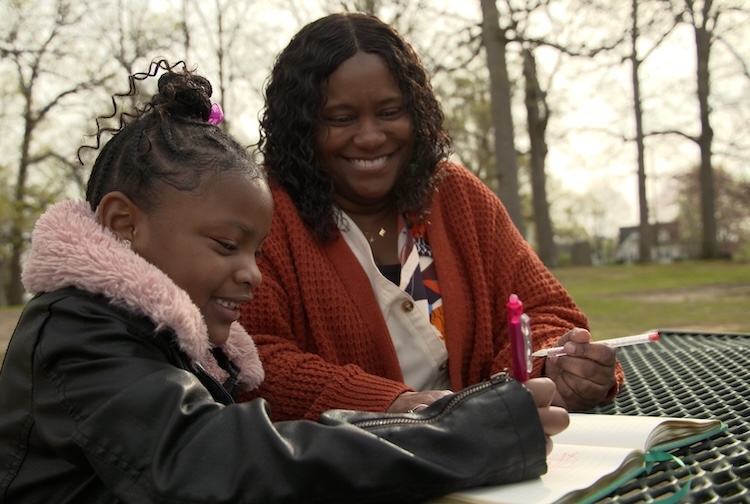
Chwanda Johnson says she is grateful for a second chance at life after receiving care from the VCU Health Comprehensive Stroke Center. (Enterprise Marketing and Communications)
A grateful Chwanda does not plan to squander the gift of a second chance at life.
“I travel more. I take care of myself more. I lost some weight. I'm eating better,” Chwanda said. “I just look at [life] different because, I mean, I almost died. I still cannot believe it.”
The VCU Health Comprehensive Stroke Center team wants to save as many lives as they can. It can be exhausting – long hours and days on call, waiting for the next stroke victim to arrive. But they don’t quit. Reavey-Cantwell says there is one reason for that:
“Chwanda. I think she summarizes everything about what we do and why we do it. All you need is one person like that and it just makes everything worth it in an instant.”
How you can be Stroke Smart
The stroke center is dedicated to raising awareness of the signs and symptoms of a stroke, along with what to do if you or a loved one is suspected of having a stroke. The center provides educational opportunities and outreach to residents as well as the undergraduates of Virginia Commonwealth University. This outreach also includes an annual conference, and a city-wide initiative dubbed Stroke Smart Richmond.
It’s easy to remember the signs of a stroke. Think FAST:
- Face drooping
- Arm weakness
- Speech difficulty
- Time to call 911
Discover what makes VCU Health a leader in stroke care, education and research
Inspired by this story? Read more about our patients and providers


